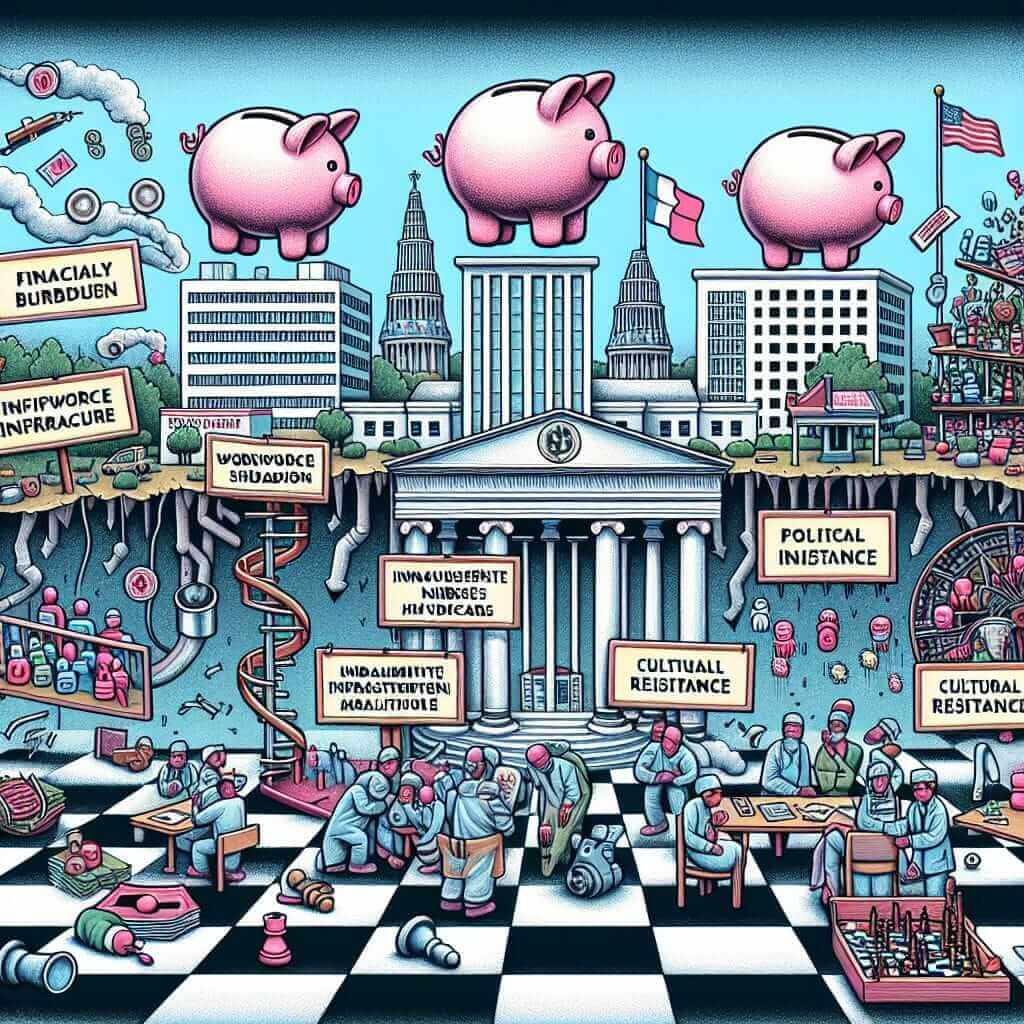The IELTS Reading section often tests candidates on a wide array of complex and contemporary issues. One such topic that frequently appears in academic readings is the challenge of achieving universal healthcare. In this article, we will explore this topic in depth, create a practice test that mirrors the IELTS format, and provide strategies and tips for tackling similar reading passages in your IELTS exam.
The Challenges of Achieving Universal Healthcare
Creating a Practice Reading Test
To help you practice, we have created a medium-level reading text that mirrors the IELTS format. This text discusses the various challenges of achieving universal healthcare, an important and highly relevant topic.
Reading Passage
Universal healthcare is a system that provides health coverage to all individuals within a society. While the idea is idyllic, numerous challenges impede its realization worldwide. One of the primary obstacles is the financial burden. Implementing universal healthcare requires substantial investment from the government, which can be a significant strain on the national budget. Countries with limited financial resources struggle to allocate sufficient funds without cutting back on other essential services.
Furthermore, the workforce required to support universal healthcare systems is immense. The need for a large number of doctors, nurses, and other healthcare professionals can be a limiting factor. Training and retaining these professionals involve both time and money, adding another layer of complexity.
Another challenge is the infrastructure. In many developing nations, the healthcare infrastructure is inadequate, with a scarcity of hospitals, clinics, and medical supplies. To transition to a system of universal healthcare, these countries would need to make major infrastructural investments.
Moreover, political will and stability are crucial for the successful implementation of such a system. Changes in government or policy can disrupt ongoing healthcare projects and affect consistency and quality of care.
Cultural factors also play a significant role. In some cultures, there is resistance to centralized healthcare systems due to mistrust in the government or a preference for traditional medicine. Overcoming these cultural barriers is essential for universal acceptance and participation.
In conclusion, while universal healthcare is a noble goal, its execution is fraught with difficulties. Financial constraints, workforce shortages, inadequate infrastructure, political instability, and cultural resistance are significant hurdles that need to be addressed. Successfully navigating these challenges requires a multifaceted approach tailored to the unique circumstances of each country.

Questions
Multiple Choice
- What is the primary financial challenge in implementing universal healthcare?
- A. High salaries for healthcare professionals
- B. Significant investment required from the government
- C. Lack of willingness to spend on healthcare
- D. High cost of medical supplies
True/False/Not Given
- Training healthcare professionals is inexpensive and fast. (True/False/Not Given)
Matching Information
- Match the challenges with their descriptions:
- Financial burden
- Workforce shortages
- Inadequate infrastructure
- Political instability
- Cultural resistance
-
a. Lack of medical facilities
b. Resistance to centralized systems
c. Required investment straining the budget
d. Changes in government affecting healthcare projects
e. Need for a large number of healthcare professionals
Sentence Completion
- One of the primary obstacles in achieving universal healthcare is __.
Summary Completion
- Many countries face financial __ when trying to implement universal healthcare. Additionally, the shortage of __ poses a significant challenge.
Answer Keys
Multiple Choice
- B. Significant investment required from the government.
True/False/Not Given
- False. Training and retaining healthcare professionals involve both time and money.
Matching Information
-
- Financial burden – c. Required investment straining the budget
- Workforce shortages – e. Need for a large number of healthcare professionals
- Inadequate infrastructure – a. Lack of medical facilities
- Political instability – d. Changes in government affecting healthcare projects
- Cultural resistance – b. Resistance to centralized systems
Sentence Completion
- Achieving universal healthcare is the financial burden.
Summary Completion
- Many countries face financial burdens when trying to implement universal healthcare. Additionally, the shortage of healthcare professionals poses a significant challenge.
Common Mistakes and How to Avoid Them
- Misinterpretation of Information: Ensure you understand the text fully before answering. Re-read difficult sections.
- Overlooking Keywords: Pay attention to keywords in the question as they guide you to the relevant part of the text.
- Guessing Answers: Base your answers on information directly provided in the text, avoid making assumptions.
Vocabulary
- Substantial (adj.) /səbˈstæn.ʃəl/ – Considerable in amount, importance, or size.
- Infrastructural (adj.) /ˌɪn.frəˈstrʌk.tʃər.əl/ – Related to the basic physical and organizational structures.
- Mistrust (n.) /mɪsˈtrʌst/ – Lack of trust or confidence.
Grammar
Passive Voice: Used to focus on the action rather than who performs it.
- Structure: [Auxiliary verb (be) + past participle]
- Example: “The workforce required to support universal healthcare systems is immense.”
Tips for Scoring High in IELTS Reading
- Practice Regularly: Regular practice improves reading speed and comprehension.
- Expand Vocabulary: A broad vocabulary helps in understanding complex texts.
- Skim and Scan: Learn to skim for the main idea and scan for specific information.
- Understand Question Types: Familiarize yourself with various question types to improve accuracy.
Consistency and effective practice are key to excelling in the IELTS Reading section. Familiarize yourself with common topics, such as the challenges of achieving universal healthcare, and apply the strategies and tips provided to maximize your score.
By thoroughly understanding these aspects and continually practicing, you can go into your IELTS exam with confidence and aim for the highest scores.
Good luck with your IELTS preparation!